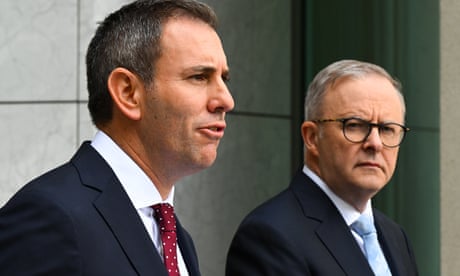- by foxnews
- 23 May 2025
Labor has poured cold water on an increase to jobseeker - leaving progressive voters scratching their heads | Paul Karp
Labor has poured cold water on an increase to jobseeker - leaving progressive voters scratching their heads | Paul Karp
- by theguardian
- 22 Apr 2023
- in news

When the independent senator David Pocock helped the government pass its industrial relations legislation, among the many concessions he extracted was a new committee of poverty experts to advise on the adequacy of welfare.
This week the government released the commitee's advice calling for a "substantial" increase to jobseeker, then immediately poured cold water on the prospect it would do so, citing its $24bn cost.
Many progressive Australians will be scratching their heads about how we got to the point where a Labor government is apparently on a go-slow when it comes to poverty reduction.
I'm going to attempt to answer basic questions, like "if not now, when?" and "if not this - then what else can the government do to help vulnerable Australians?".
To understand, we'll need to wind the clock back a little further.
In 1997 John Howard tied the unemployment benefit, then known as Newstart, to inflation while pensions continued to grow in line with wages. This ushered in a decades-long freeze in real terms in the Newstart payment.
Pressure to increase the payment grew and grew, as politicians found themselves either ridiculed for attempting to say with a straight face that they could live on $40 a day or facing charges of hypocrisy for admitting, no they couldn't - but not doing anything to raise the rate.
In May 2018 Labor under Bill Shorten promised to review the rate of Newstart. After it lost the 2019 election, Labor under Anthony Albanese continued to call on the Coalition government to raise the rate but declined to say how much it would lift it by, if elected.
Then came the global pandemic, and the unusual sight of a Coalition government not only introducing wage subsidies to keep Australians connected to their shuttered workplaces but also doubling unemployment benefits - renamed jobseeker - through the coronavirus supplement.
Jobseeker recipients found their lives transformed, no longer having to make hideous sacrifices like choosing between medicine and food.
It is in this era we find the vintage tweets from Albanese and then shadow treasurer, Jim Chalmers, piling pressure on the Coalition not to cut the payment back to $40 a day once the worst of the pandemic was over.
In February 2021, the Morrison government removed the coronavirus supplement but raised the base rate of jobseeker by $50 a fortnight.
Many assumed that Labor would still lift the rate, but in fact the opposition did not promise this - instead favouring a vaguer commitment to work to alleviate poverty "in every budget".
The $50 a fortnight increase - or just $3.57 a day - released some of the political pressure that had been building to lift the payment, and it became clear Labor's plan had been to argue for an increase on the Coalition's watch, not to promise to outspend them on jobseeker.
Labor under Albanese therefore came to government with maximum strategic ambiguity about how it would treat the payment. Its first budget in October contained no increase, beyond regular indexation.
Then Pocock won his committee, and the pressure began to build again.
We're at a crossroads now. The treasurer, Jim Chalmers, could not bring himself to say this week that the government was even considering a jobseeker increase, only that it is "working methodically through those recommendations and we will come to a concluded view on it".
"But there are different views about how you provide that support. There are different views about how long it takes and how you stage it."
While senior members of the government whistle the fiscal responsibility tune in public, MPs say privately that all is not lost on the poverty-reduction front.
They point to the possibility the May budget could expand eligibility for the single parent payment, a recommendation of both the economic inclusion advisory committee and the women's economic equality taskforce.
Another recommendation of the committee was for place-based responses to poverty, which Chalmers hinted in January the government would adopt. The treasurer told Guardian Australia's political editor, Katharine Murphy, that he and the social services minister, Amanda Rishworth, are looking to "identify some of the most vulnerable communities" to start on poverty reduction "where those challenges are most acute".
The government could also lift commonwealth rent assistance, or even order a smaller increase to jobseeker - just not the "substantial" one its poverty experts asked for.
Labor's argument is that it can't undo decades of stagnation in the rate of jobseeker in one budget. That much might be true.
But if Labor's poverty reduction task is a journey of a thousand miles, that's no excuse not to take the first step. It had better start sooner rather than later.
- by foxnews
- descember 09, 2016
United Airlines flight returns to Hawaii after concerning message found on bathroom mirror; FBI investigating
United Airlines Flight 1169 to Los Angeles returned to Hawaii after a "potential security concern" aboard the plane. The FBI and police are investigating.
read more


